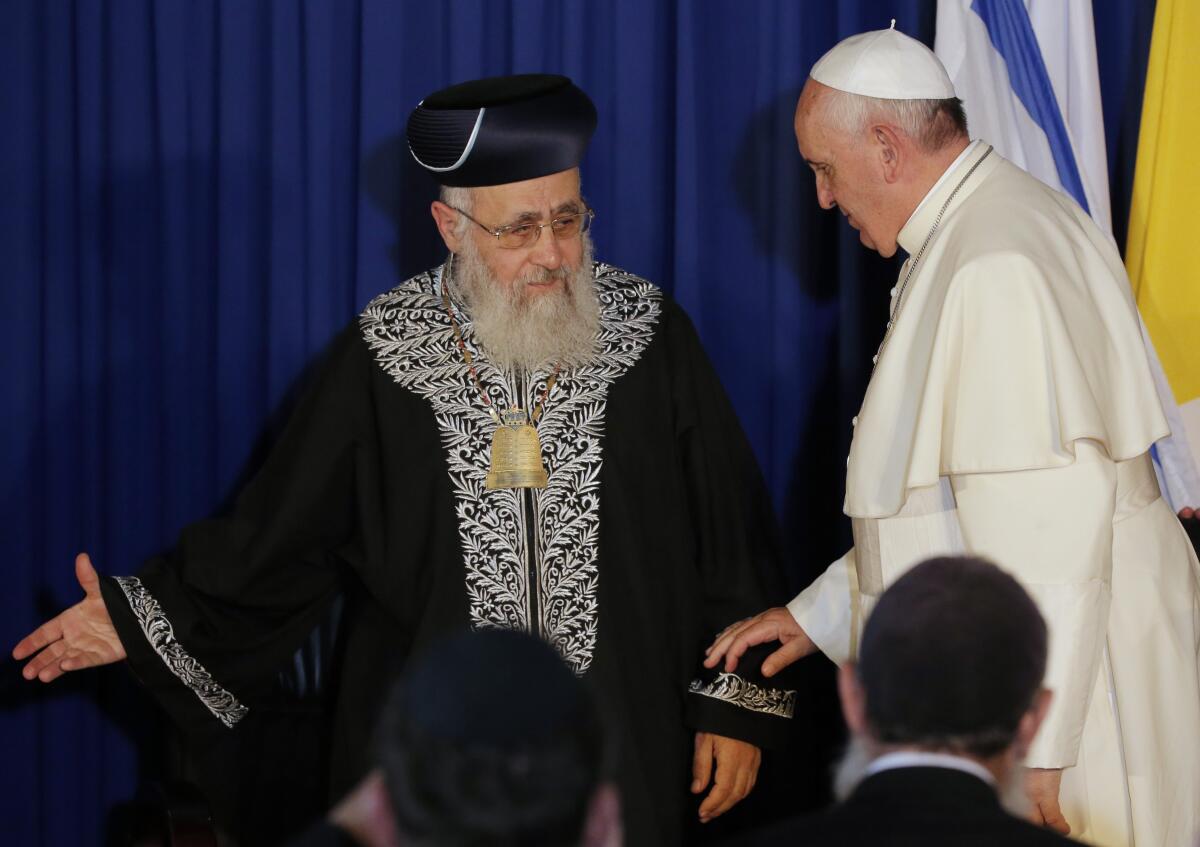Israel in uproar after chief rabbi calls ex-Soviet Jews ‘religion-hating goys’

- Share via
JERUSALEM — Between 1989 and the mid-2000s, as the Soviet Union unraveled and fell into ongoing turbulence, about 1.5 million Jews made their way across newly opened borders and fled.
One million of them went to Israel, where they were received as long-lost brethren and provided financial assistance to resettle.
For many Israelis, the arrival of “the Russians” was experienced as something akin to the fulfillment of a biblical prophecy, in which the reincarnated Jewish homeland welcomed exiles to their ancestral home.
Israel’s Law of Return, in place since its founding in 1948, confers the right to citizenship to any Jew. And, in an echo of the Nazi decree subjecting even the grandchild of a Jew to racial laws and eventual death, the Israeli law guarantees citizenship, and safe haven, to a spouse, child or grandchild of a Jew — even one with little connection to organized Judaism.
But the Soviet prohibition on religious practice left many of these newly immigrated Jews, and their non-Jewish relatives, exposed to slurs and slights from conservative rabbinic figures in Israel.
On Tuesday, the tension between Israeli civil society and religious authority exploded into the public sphere when video obtained by the Ynet news portal showed Israeli Sephardi Chief Rabbi Yitzhak Yosef denouncing “communist, religion-hating goys,” referring to gentiles.
“Hundreds of thousands or tens of thousands of goys came to Israel under the Law of Return,” he protested at a rabbinical gathering last week in Jerusalem.
On Wednesday, calls to fire Yosef grew. The anti-racism unit in Israel’s justice ministry announced that more than 100 complaints of incitement were filed against the rabbi.
Yosef, one of two Israeli chief rabbis who are public officials working for the Ministry of Religious Affairs, told the audience: “There are many, many non-Jews here, some of them communists, hostile to religion, haters of religion. They are not Jews at all — goys. Then they vote for parties that incite against the ultra-Orthodox and against religion.”
Their votes, in the midst an electoral year, appeared to be the rabbi’s major concern.
The Israeli rabbinate’s budget depends on public funds apportioned to religious political parties under the complex negotiations that establish coalition governments.
The more votes, the better the budgets for public employees who have traditionally controlled curricula for Jewish education, certified religious marriages and supervised religious conversion among their myriad duties.
Traditionally, ultra-Orthodox parties have served as political kingmakers, securing significant benefits for their followers, principal among them a blanket exemption from the military draft imposed on Israeli 18-year-olds.
In the last year, that leverage has shifted to Yisrael Beiteinu, the secular, right-wing party founded by Avigdor Lieberman, a former defense minister who has successfully parlayed Israelis’ growing exasperation with the power of religious authorities to become Prime Minister Benjamin Netanyahu’s most tenacious nemesis, and Israel’s most consequential political leader.
Three times in a little over a year, Lieberman’s intransigence has prevented Netanyahu from governing.
In December 2018, he provoked the collapse of Netanyahu’s government, and, by refusing to yield to the coalition demands of religious parties, he prevented the formation of Cabinets after elections last April and September.
Lieberman, whose supporters are primarily emigres from former Soviet republics, called for Yosef’s immediate suspension and asked the judiciary to investigate his possible breach of laws against racist incitement.
In its Wednesday editorial the Jerusalem Post called on Netanyahu to fire Yosef, saying his remarks “are just the latest reason why the Chief Rabbinate needs to be abolished, and rabbis like him need to stop getting paid a salary from the state.”
Tarnopolsky is a Times special correspondent.
More to Read
Sign up for Essential California
The most important California stories and recommendations in your inbox every morning.
You may occasionally receive promotional content from the Los Angeles Times.










